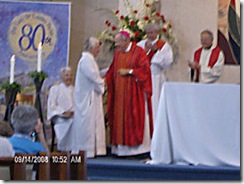(All emphasis in the following is mine.)
While exploring the web site of the Diocese of Tulsa I came across an article occasioned by Pope Benedict XVI's comments on Catholic education during his recent visit to this country.
The authors pick up on His Holiness' ongoing critique of relativism, observing that the Church's
essential missionary thrust in the world has been neutralized by the acceptance of a seductive relativism that proclaims that since what may be true for me may not be true for you since everyone’s opinion is equally (or relatively) true.
It is within the context of this confrontation between the universal truth of the Gospel ... and the rampant relativism and subjectivity of our age ... that the Pontiff addressed our indispensable need for Catholic education.
It is the task of our Catholic educational institutions to combat what then Joseph Cardinal Ratzinger termed the "dictatorship of relativism."
In our educational institutions we grow in our knowledge of Him and are strengthened so that we can give unfailing witness to the truth of that encounter in an open, public forum.
The authors then make the case that religious education programs simply cannot accomplish this goal.
It must be conceded that this is a task beyond even the finest parish religious education programs. No Sunday school program, no matter how complete the content of its textbooks, how deep the commitment of its volunteers or joyful they are in their service, is capable of building the kind of social community which is founded in this kind of culture and which is capable of revealing in itself the interior life and mission of the Church.
They cannot do this because they will always be secondary to the primary education of their students, which is secular and relativistic.
[Religious education] classes add an additional class to the secular curriculum, but this one class, this one hour [75 minutes at my parish] a week, is not capable of revealing the dangerous deficiencies of secular assumptions, because by adding one class in religious studies on Sunday or on Wednesdays [Mondays at my parish], we actually reinforce the secular presumption that religion has both its value and place, but separate and apart from the things of “the real world.” We accept implicitly the world’s judgment that the things of God are one of its many categories of inquiry and God Himself just one “thing” among all the rest to be studied.
I think it is imperative that we acknowledge and accept that our first and foremost effort in religious education must be to revitalize our Catholic schools and do whatever is necessary to make certain that every family in the Diocese has the right to this kind of religious education for their children.
As someone who is beginning his 5th year as a junior high catechist I could not agree more. While I am still learning my craft - and always will be - it has already become blindingly obvious that the parish religious education setting, no matter how good it might be in its own right, is but a poor second to the day in and day out exposure to the Catholic faith and culture that takes place in a Catholic elementary school.
That is why Catholic schools should be among the highest priorities in every diocese.
That they are not in this diocese is one of the primary reasons we are in such sad shape.






